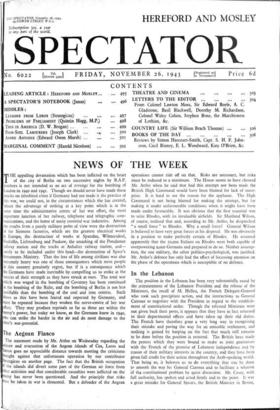The Aegean Fiasco The statement made by Mr. Atdee on
Wednesday regarding the seizure and evacuation of the Aegean islands of Cos, LerOs and Samos goes no appreciable distance towards meeting the criticisms brought against that unfortunate operation by our contributor Strategicus on, another page. The fact that the British occupation of the islands did divert some part of the German air force from Cher activities and that considerable casualties were inflicted on the 'r,erny has never been questioned. And the principle that risks ict be taken in war is elemental. But a defender of the Aegean operations cannot ride off on that. Risks are necessary, but risks must be reduced to a minimum. The House seems to have cheered Mr. Attlee when he said that had this attempt not been made the British High Command would have been blamed for lack of enter- prise. It is hard to see the reason for the applause. The High Command is not being blamed for making the attempt, but for making it under unfavourable conditions when it might have been made under favourable. It was obvious that the first essential was to seize Rhodes, with its invaluable airfields. Sir Maitland Wilson, of course, realised that and, according to Mr. Attlee, he despatched " a small force " to Rhodes. Why a small force? General Wilson is believed to have very great forces at his disposal. He was obviously in a position to make perfectly certain of Rhodes. He assumed apparently that the 20,000 Italians on Rhodes were both capable of overpowering 9,000 Germans and prepared to do so. Neither assump- tion, the one military, the other politico-psychological, was justified. Mr. Attlee's defence has only had the effect of focussing attention on the phase of the operations which is susceptible of no defence.


























